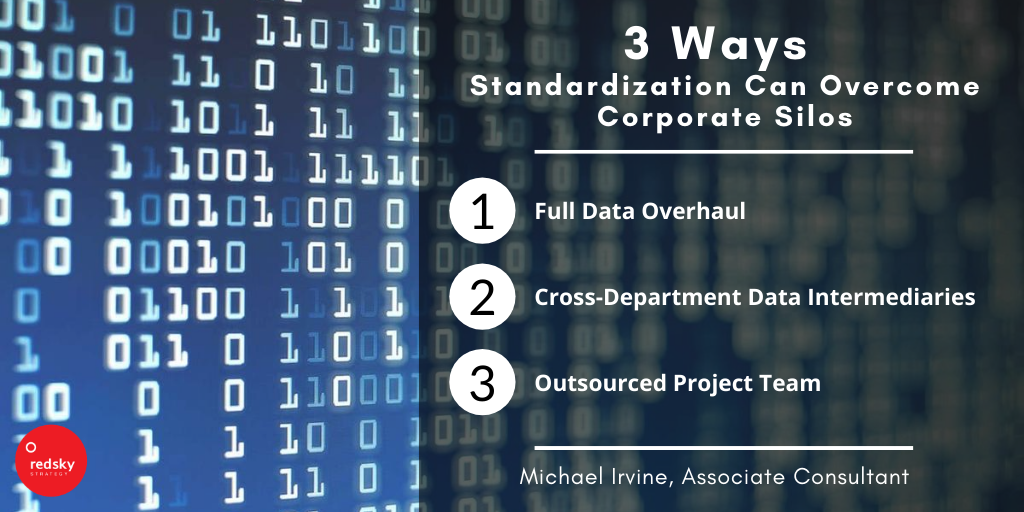News
3 Ways Standardization Can Overcome Corporate Silos

By Michael Irvine, Associate Consultant
A Story of Collecting Data Across Large Corporations
It’s the week of a project’s delivery, and it’s time to build out the final report from months of research, data extraction, and collaboration with the client. The delivery involves the conceptual overview, and in-depth training for a new planning and budgeting tool for use by mid-level managers. Every department across the company will rely on this data, and will refer to it when budgeting their resources throughout the next fiscal year.
The report requires a few small but critical pieces of information from a financial document, but communications have been with the operations team, and the one contact on the finance team has not answered emails. How do you obtain the document with the critical information? If you ask the operations team, you’re met with unassuming shrugs — but they give you a list of five emails of other people on the finance team who may (or may not) be able to help you get the report.
The person with the fifth email address has access to the report. It’s finally in your inbox. But the structure and terminology of the data are completely different from the rest of the info. So five contacts and countless communications prior, you’re finally able to receive a report rendered useless as a result of dissimilar data categories.
These silos created among departments within corporations is nothing new, but few of us could have predicted their profound effect on the standardization of data. Even fewer people have found a way to correct it.
In database analytics, a common saying is that the magic number is one. One platform to store, extract, and manipulate data whose terminology (or data dictionary) is standardized among departments. For most companies that have been around since before the Big Data boom, this idea seems nearly impossible, because their departmental processes have been in place and running on their own terminologies for years. This lack of consistency within companies has brought with it significant drops in efficiency and increased costs, with no long-term resolution for the issue. Everything — from manufacturing fulfillment to product forecasting to material procurement — has experienced and suffered from data inconsistency.
So how can corporations combat this ongoing issue? How do they standardize data, improve efficiency, and mitigate costs for the future?
Three Data Standardization Methods For Companies
Here are three ways companies are getting ahead of the curve and overcoming corporate data silos:
1. Full system overhaul: In this case, a company’s databases are replaced by a new and improved system, and a new data dictionary is structured by analytics leaders and agreed upon by executives and directors across departments. From here, past data is adjusted to represent this new terminology — and in some cases, new systems are implemented that limit the alteration of terminology in the future, thus further preventing data silos from reemerging. This seems to be the best long-term solution, although it has proven to be very costly and can take years to implement.
2. Cross-department data intermediaries: In this situation, data experts are assigned to each department and communicate with each other in order to create a standardized data structure. It’s critical that these intermediaries have extensive knowledge of their respective department, so that all relevant terminology can be accounted for. In some cases, entire teams have been created in order to reconcile data between departments.
3. Outsourced project team: Here, data analytics and governance experts develop different methodologies to locate data terminology gaps among departments, and then standardize them in a way that is sustainable for the future. The process could consist of integrating multiple databases within an organization, or using the current database system to start from scratch and create new ones that encompass the data dictionary company stakeholders want.
It’s important for companies to understand that they have options to solve their data issues, and that these options offer solutions for both the short and long term. At RedSky, we take pride in helping companies develop consistency in their data now and beyond to ensure a sustainable future. If you’d like to learn more about standardizing your company’s data processes, please give us a call. We’d love to help.
